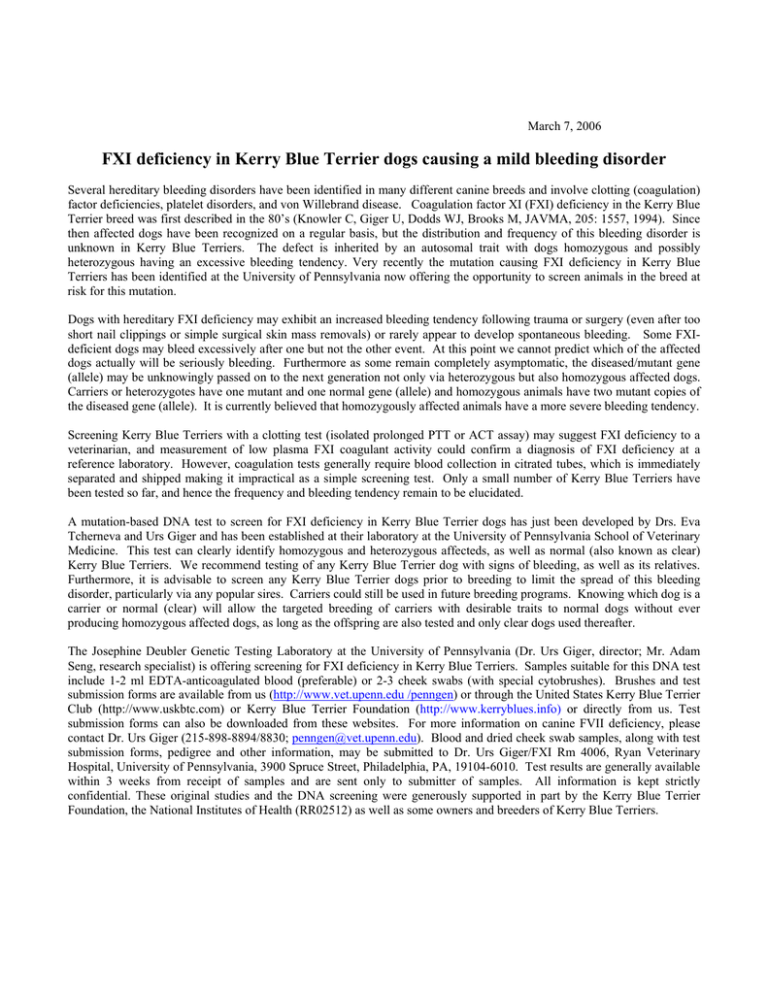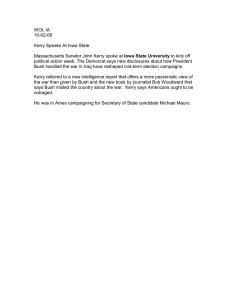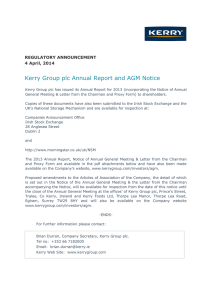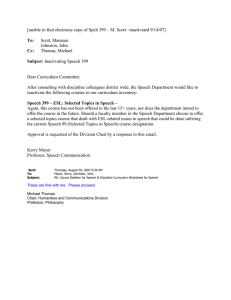It is possible that you may have misread the information on the
advertisement

March 7, 2006 FXI deficiency in Kerry Blue Terrier dogs causing a mild bleeding disorder Several hereditary bleeding disorders have been identified in many different canine breeds and involve clotting (coagulation) factor deficiencies, platelet disorders, and von Willebrand disease. Coagulation factor XI (FXI) deficiency in the Kerry Blue Terrier breed was first described in the 80’s (Knowler C, Giger U, Dodds WJ, Brooks M, JAVMA, 205: 1557, 1994). Since then affected dogs have been recognized on a regular basis, but the distribution and frequency of this bleeding disorder is unknown in Kerry Blue Terriers. The defect is inherited by an autosomal trait with dogs homozygous and possibly heterozygous having an excessive bleeding tendency. Very recently the mutation causing FXI deficiency in Kerry Blue Terriers has been identified at the University of Pennsylvania now offering the opportunity to screen animals in the breed at risk for this mutation. Dogs with hereditary FXI deficiency may exhibit an increased bleeding tendency following trauma or surgery (even after too short nail clippings or simple surgical skin mass removals) or rarely appear to develop spontaneous bleeding. Some FXIdeficient dogs may bleed excessively after one but not the other event. At this point we cannot predict which of the affected dogs actually will be seriously bleeding. Furthermore as some remain completely asymptomatic, the diseased/mutant gene (allele) may be unknowingly passed on to the next generation not only via heterozygous but also homozygous affected dogs. Carriers or heterozygotes have one mutant and one normal gene (allele) and homozygous animals have two mutant copies of the diseased gene (allele). It is currently believed that homozygously affected animals have a more severe bleeding tendency. Screening Kerry Blue Terriers with a clotting test (isolated prolonged PTT or ACT assay) may suggest FXI deficiency to a veterinarian, and measurement of low plasma FXI coagulant activity could confirm a diagnosis of FXI deficiency at a reference laboratory. However, coagulation tests generally require blood collection in citrated tubes, which is immediately separated and shipped making it impractical as a simple screening test. Only a small number of Kerry Blue Terriers have been tested so far, and hence the frequency and bleeding tendency remain to be elucidated. A mutation-based DNA test to screen for FXI deficiency in Kerry Blue Terrier dogs has just been developed by Drs. Eva Tcherneva and Urs Giger and has been established at their laboratory at the University of Pennsylvania School of Veterinary Medicine. This test can clearly identify homozygous and heterozygous affecteds, as well as normal (also known as clear) Kerry Blue Terriers. We recommend testing of any Kerry Blue Terrier dog with signs of bleeding, as well as its relatives. Furthermore, it is advisable to screen any Kerry Blue Terrier dogs prior to breeding to limit the spread of this bleeding disorder, particularly via any popular sires. Carriers could still be used in future breeding programs. Knowing which dog is a carrier or normal (clear) will allow the targeted breeding of carriers with desirable traits to normal dogs without ever producing homozygous affected dogs, as long as the offspring are also tested and only clear dogs used thereafter. The Josephine Deubler Genetic Testing Laboratory at the University of Pennsylvania (Dr. Urs Giger, director; Mr. Adam Seng, research specialist) is offering screening for FXI deficiency in Kerry Blue Terriers. Samples suitable for this DNA test include 1-2 ml EDTA-anticoagulated blood (preferable) or 2-3 cheek swabs (with special cytobrushes). Brushes and test submission forms are available from us (http://www.vet.upenn.edu /penngen) or through the United States Kerry Blue Terrier Club (http://www.uskbtc.com) or Kerry Blue Terrier Foundation (http://www.kerryblues.info) or directly from us. Test submission forms can also be downloaded from these websites. For more information on canine FVII deficiency, please contact Dr. Urs Giger (215-898-8894/8830; penngen@vet.upenn.edu). Blood and dried cheek swab samples, along with test submission forms, pedigree and other information, may be submitted to Dr. Urs Giger/FXI Rm 4006, Ryan Veterinary Hospital, University of Pennsylvania, 3900 Spruce Street, Philadelphia, PA, 19104-6010. Test results are generally available within 3 weeks from receipt of samples and are sent only to submitter of samples. All information is kept strictly confidential. These original studies and the DNA screening were generously supported in part by the Kerry Blue Terrier Foundation, the National Institutes of Health (RR02512) as well as some owners and breeders of Kerry Blue Terriers.







